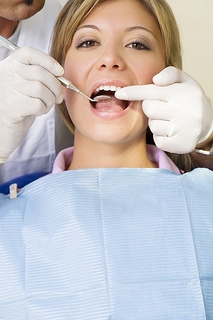
Your smile is in the spotlight every day, helping you greet the world with confidence! But when you’re self-conscious about discolored spots on your teeth, it’s time to get some professional advice to deal with these troublesome tints.
Discolored patches, both dark and light, can develop for a number of different reasons. Some markings are cosmetic only, and some spots require treatment. Some can be removed with a professional cleaning, and some might require more serious restoration. Let’s have a look at some of the common causes of enamel discoloration.
Decayed enamel can appear as a brown spot on the tooth. A dark edge around a filling might mean decay underneath.
Regular checkups at our Boston, Massachusetts office will help catch small cavities before they become big ones. If you need a filling, the filling color can be matched to your tooth color for an undetectable restoration.
Bacteria in plaque produce acids, which attack our teeth. These acids erode minerals such as calcium and phosphorus from enamel, leaving a weak spot that is vulnerable to decay. This process is called “demineralization,” and often leaves a whiter spot on a tooth where minerals have leached away. Common reasons for demineralization are neglecting dental hygiene, failure to clean around braces, and a diet filled with sugary and acidic foods.
Fluoride and enamel-strengthening toothpastes, a healthy saliva flow, and a balanced diet help our teeth “remineralize,” bathing teeth in minerals that can help replace those that have been lost. But if you have lingering white spots due to demineralization, John Pappas can provide some options, including whitening, microabrasion, and veneers.
Fluorosis is a cosmetic condition caused by exposure to too much fluoride while the permanent teeth are still forming (generally, during the years before a child’s eighth birthday). Small white spots and patches are a common result of mild fluorosis. In more serious cases, teeth can be pitted and stained with brown, gray, or black spots.
Preventing fluorosis begins in early childhood. Talk to John Pappas about fluoride levels in local tap water if you have any concerns. Use only the recommended amount of toothpaste (the size of a grain of rice for children three and under; the size of a pea for children three to six), and show your child how to spit out toothpaste and rinse after brushing. Keep fluoride toothpastes and other fluoride products out of the reach of young children. Don’t give children fluoride supplements or fluoride rinses without discussing it with John Pappas.
If your own teeth have been affected by fluorosis, talk to us. Again, this is a cosmetic condition affecting otherwise healthy teeth. Whitening treatments can be helpful in mild cases, microabrasion has been effective for mild to moderate cases, and, for severe cases, cosmetic restorations such as bonding and veneers are an option.
Are you seeing an accumulation of dark brown spots and stains on your teeth, especially between the teeth and at the gum line? This might mean that you have tartar buildup. When you brush plaque away every day, your enamel stays smooth and clear. But when plaque builds up over time, it hardens and becomes tartar.
How hard is tartar? So hard that it can only be removed with a professional cleaning. Eliminate this source of spots and staining with twice daily brushing and daily flossing, and make sure regular professional cleanings are on your calendar.
Medications taken while teeth were developing (notably, antibiotics in the tetracycline family) can cause discoloration. Medical conditions such as celiac disease and enamel hypoplasia can affect both tooth color and enamel formation.
Cosmetic treatment and restorations can help with discoloration caused by medications, and restorations such as bonding, veneers, and crowns can restore tooth appearance and function when medical conditions cause imperfections in enamel color and structure.
If you’re unhappy with the overall whiteness of your smile, a professional whitening might be just what you’re looking for. If specific patches, streaks, and spots of a different color are dimming your bright smile, it’s time for an exam. John Pappas will be able to tell you the reason for any discolored enamel as well as present you with all your treatment options. Put the spotlight back where it belongs—on your healthy, confidant smile!





 Website Powered by Sesame 24-7™
Website Powered by Sesame 24-7™